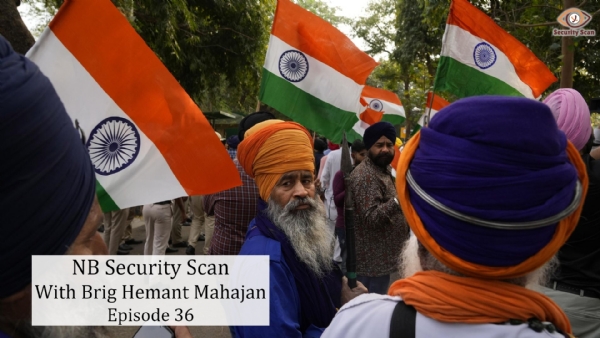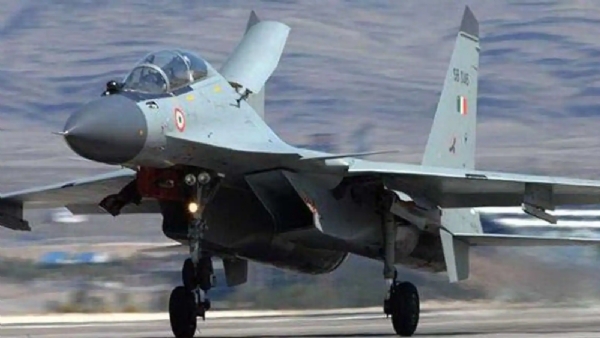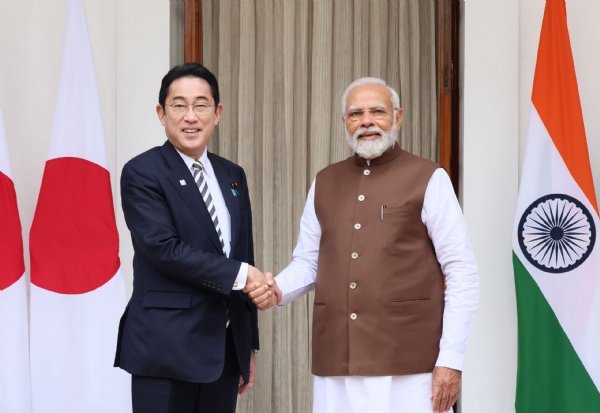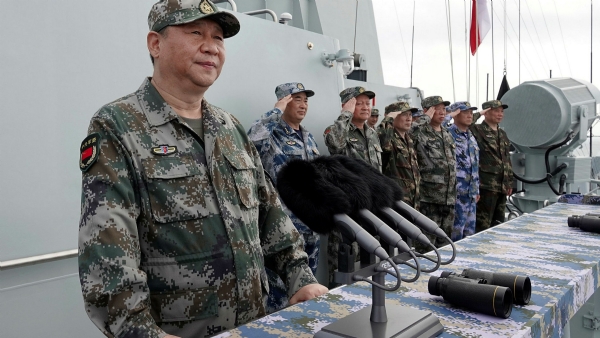#SecurityScan 36: Diaspora Warfare, AUCKUS & Indo Pacific and more
Any reading of the Vienna Convention on Diplomatic Relations, 1961, which obliges the host nation of a diplomatic mission to provide adequate security for mission premises and to prevent any intrusion or damage, should make it clear that London had failed in its obligation.
Total Views |
This article is a summary of important events that have taken place in last one week affecting, India's national security.
NEWS IN BRIEF
1.Australian Prime Minister Anthony Albanese on Saturday said that he has assured Prime Minister Narendra Modi that those responsible for attacks on Hindu temples in Australia will "face the full force of the law".

2. India tells UK to deport 4 Khalistanis involved in London High Commission attack.Individuals involved in the violence include Harjeet Singh, Manroop Singh, Mandeep Singh and Rajinder Singh. The four held Indian passports and remain actively involved in the separatist movement. Video shows Khalistanis hurled eggs, ink-filled balloons at Indian embassy in London
3. Xi Jinping's visit to have no impact on India-Russia ties: Russian envoy.Chinese President Xi Jinping was on a three-day visit to Russia from March 20 to 23.
4. Chinese warships in the Pacific have raised an alarm. They are said to have been jamming communication systems of various commercial airlines.
INTERNAL SECURITY
Informed Debate For New Drug de-addiction strategy In Punjab
Punjab, has nearly 10 lakh addicts; 2.62 lakh were undergoing treatment at government de-addiction centres and 6.12 lakh at private rehabilitation facilities. The actual number would be far higher, the Chief minister said, presenting a worrying reality check over a negligible rate of cure. The number of addicts is rising, and not coming down, despite Punjab having 528 outpatient opioid assisted treatment centres as well as 36 government and 185 private de-addiction facilities. There are 19 government and 74 private rehabilitation centres, but several of them fare badly on follow-up after initial treatment; thus, most patients suffer a relapse.
“RECOMMENDATIONS: Drug addicts should not be sent to jails; they should go to rehabilitation centres.The new strategy includes utilising services of religious preachers, setting up yogshalas, providing livelihood skills, and ensuring doctor-psychiatrist teams to handle the detox part. There are also plans for supplying an antidote to the deadly drugs. While embarking on a policy change, the government needs to back it up with a periodic assessment. Leaders of all parties should use their energies for an honest, informed debate on drug de-addiction programmes.”
Diaspora Warfare-Proactive Diplomacy
In a hardball diplomatic move, India removed extra barricades outside the British high commission and the residence of the high commissioner in New Delhi on Wednesday. And, presto, security outside the Indian high commission in London that again saw pro-Khalistani protests was noticeably better than earlier. That it came to this is entirely the fault of Britain, which seems to have confused earlier Indian interventions with a sign of weakness. The tricolour was forcibly lowered by vandals. Any reading of the Vienna Convention on Diplomatic Relations, 1961, which obliges the host nation of a diplomatic mission to provide adequate security for mission premises and to prevent any intrusion or damage, should make it clear that London had failed in its obligation.
India, therefore, had to send a message. If being nice doesn’t work, sometimes in diplomacy one has to act a little rough.The onus is on the Sunak government to repair relations from this point on. Bear in mind that India has plenty of leverage – Indian students in Britain are a major funding source for higher education,for second rate British universities, Indian rich are important players in London’s luxury real estate market, India is the biggest market for Scotch whisky by volume.
In recent weeks and months, Khalistani groups have been upping the ante both inside India and abroad. The inspiration is clearly from outside, including from Pakistan. Outside India, our diplomatic missions have been attacked, including most recently in London and San Francisco. Many Hindu temples have been vandalised in Australia and elsewhere.
The violent actions inside India need firm and nuanced handling, while the ones outside need proactive moves to counter disinformation.
Fuelling economic growth J&K
THE proposed opening of a mega shopping mall and an IT tower in Srinagar by a UAE-based group is a confidence-booster for foreign as well as domestic investment in Jammu and Kashmir. It offers, an infrastructure upgrade and assimilation Kashmir in India’s growth story. These representatives of the real estate, hospitality, food processing, agriculture and other sectors were invited to get a first-hand experience and allay their concerns over the law and order situation. Promising to create a favourable ecosystem for investors, the Lt Governor has assured allocation of land within 15 days of the submission of any proposal.
The Jammu and Kashmir administration has received investment proposals from 5,000 domestic and foreign companies within 22 months of implementation of the new industrial policy, with 45 units starting their operations last month. A steel processing plant is coming up at Pulwama in south Kashmir. J&K has also caught attention because of the large discoveries of lithium. India could potentially have the third largest reserves of the prized metal. Fuelling economic growth could be the most transformative confidence-building measure, bringing relief to the unemployed youth and giving a fillip to development.
A record 1.8 crore tourists visited Jammu and Kashmir in a year; there’s been a huge reduction in every kind of violence.
Assembly elections in the state must be conducted as early as possible.
Popular Front Of India Planning To Target 10% Muslim Population: NIA
In the charge sheet, NIA quoted a couplet extracted from one of the YouTube channels of PFI: "Wahi purani riwayat ko lane wale hai, tumhe pata hai na hum log aane wale hai. Duniya ke har zalim se takrane wale hai, hum apni tarikh ko phir dohrane wale hai (loosely translated as 'will bring the old tradition, we are going to come. We are going to collide with every tyrant of the world, we are going to repeat our date again')."
Living with Covid - Get the basics right; no need for drastic step
According to health experts, the fresh spike in cases is not a harbinger of a new wave. They have asserted that there is no need to panic as the fatality rate and the number of hospitalisations are not increasing significantly. This reassurance should suffice to rule out any drastic step to curb the movement of people. The key takeaway from the Covid-induced restrictions imposed in the past three years is that they have merely delayed the inevitable. The lockdown of 2020 proved disastrous for the Indian economy. The havoc wreaked by the zero-Covid policy, which China had to withdraw after nationwide protests, gives India another reason to not make any self-defeating move.
The current surge is being attributed to Omicron XBB sub-variants. A recent US study says that vaccines and boosters are effective against these highly transmissible strains.
“RECOMMENDATIONS: The five-fold strategy — test-track-treat-vaccination-Covid-appropriate behaviour — should be continued in earnest as it has proved to be a success. An area of concern is the booster dose coverage, which has remained below par. The authorities need to revitalise the immunisation campaign and urge people to shed vaccine hesitancy.”
EXTERNAL SECURITY
Pentagon provided real-time intelligence to Indian Army on India-China 2022 border clash, White House says "Can't confirm that"
According to the U.S. News and World Report, the US government for the first time provided real-time details to its Indian counterparts of the Chinese positions and force strength in advance of incursions by the PLA in Arunachal Pradesh's Tawang Sector. The US has refused to confirm a news report that the US provided crucial real-time intelligence to the Indian military last year that helped it successfully repel the Chinese "incursions" in the Himalayas. The report said that this act caught China's People's Liberation Army off-guard, enraged Beijing, and forced the Chinese Communist Party to reconsider its approach to land grabs along its borders.
Act on Parliamentary Standing Committee on Defence report on challenges faced by India’s armed forces
The Parliamentary Standing Committee on Defence, in its report tabled in the Lok Sabha on Tuesday, has flagged a slew of challenges being faced by India’s armed forces. The panel has expressed concern over ‘considerable delay’ in the supply of 40 Tejas Light Combat Aircraft (LCA) by Hindustan Aeronautics Limited.’The Tejas LCA — an all-weather, multi-role fighter aircraft that can be deployed for offensive air support, close combat and ground attacks — is of crucial importance for the country’s military readiness.. It is inexcusable that issues pertaining to the premier fighter jet’s design, systems and weapons have still not been resolved.
The committee has suggested that the Army’s capital budget should be increased so as to enhance its capacity to ward off challenges from across the borders. Ample funds are one of the prerequisites to ensure that the projects related to defence modernisation and indigenisation are not held up. Optimum, time-bound utilisation of these funds also has to be prioritised.Another area of concern is the hefty import bill.
The main challenge is the inability of Hindustan Aeronautics Limited to supply LCA in time. They must improve their efficiency. We have to ensure that defence imports are brought to zero in the next few years.
Sukhoi fighter jet engages aircraft arrester barrier on landing at Pune airport; probe on

The incident, which basically involved the use of a speed control technique, took place in the morning at the Air Force Station in Lohegaon in Pune after a routine training sortie, and a probe has been ordered.
COUNTERING CHINESE MULTI DOMAIN WAR
Japan, Australia strengthening ties with India
Japanese Prime Minister Fumio Kishida visited India on March 19-20; the highlight of his trip was his elucidation of the new Japanese policy for a free and open Indo-Pacific region.
Earlier, Australian Prime Minister Anthony Albanese was in India for the first India-Australia annual summit on March 10. Out of its three Quad partners, India now has annual summits with Japan and Australia.
Overall, the Quad partners with India are now consistent in grasping several opportunities to meet during the year beyond their annual summits. The G7 summit in Hiroshima, the Quad summit in Sydney and the G20 summit in New Delhi in the next six months will provide ample opportunities for the Quad leadership to meet. The Quad foreign ministers recently met in New Delhi. They will meet at the UN General Assembly in September too.
Japan and South Korea made up after a long hiatus of a tense relationship. Australia, the UK and the US (AUKUS) announced their plan to deploy nuclear-powered submarines in Australia for countering China. The Ministers of Defence of Japan, the UK and Italy met in Tokyo and decided to develop a next-generation fighter jet by 2035, confirming a plan initially discussed in 2022. German Chancellor Olaf Scholz visited Tokyo a week earlier and among other things discussed closer defence cooperation with the Indo-Pacific which he discussed earlier in India.
After the Australian PM visited India, the AUKUS announcement came and prior to the Kishida visit, Japan for the first time introduced its military missile detachments to the distant islands within the Senkaku chain which will defend the Senkakus in the East China Sea and also have a bearing on the Taiwan crisis if it erupts. Thus, much is happening in the Indo-Pacific mainly to counter China.
Constraining China and its aggressive intent in the Indo-Pacific is a shared approach that India follows with Japan, Australia and the US as well as with other countries in the region.
Kishida was clear in saying that India was indispensable to the Indo-Pacific. Prime Minister Narendra Modi has been making attempts to salvage Buddhism to advance India’s global interests. His latest gesture of taking PM Fumio Kishida to the Bal Bodhi Tree in Buddha Jayanti Park and gifting him a sandalwood Buddha statue was a masterstroke in diplomacy.
Australian PM Albanese, while in India, had a symbolic visit to aircraft carrier INS Vikrant. Australia will host the Malabar maritime exercise for the first time this year. Their joint adherence to the Quad principles and mutual support to India in the Indo-Pacific was palpable during the visit.
India has initiated the Indo-Pacific Oceans Initiative (IPOI). Japan and Australia are among the countries, besides Singapore, Italy, France and Indonesia, who are partnering with India in some of the pillars of cooperation of the IPOI.

Kishida announced several pillars of cooperation under the free and open Indo-Pacific venture. These are the principles for peace and rules for prosperity, including a free, fair and just economic order. This also covers quality infrastructure investment and transparent development finance. The second pillar is addressing the challenges in an ‘Indo-Pacific way’. The global commons approach will be used to deal with climate, environment, public health and cyberspace. Multi-layered connectivity is the third pillar. Here, the emphasis is on diversifying reliance on single countries to avoid vulnerabilities.
Kishida mentioned India, especially its North-East, ASEAN and the Pacific islands as important focal areas for such connectivity. The fourth pillar aims to increase knowledge and human resource development. The ASEAN and the Pacific islands are areas where Australia, too, is willing to collaborate with India.
Japan is ready to revise its development cooperation charter to use its official development assistance (ODA) more imaginatively, mobilise private capital and deal more conclusively with socio-economic challenges. Japan’s appetite for public funds to be invested for the ODA alone is diminishing and it wants to increase its private sector FDI.
By adding all this, Japan proposes the mobilisation of about $75 billion in the Indo-Pacific region by 2030 for developing infrastructure, connectivity and the like. In this, Australia is ready to harness more capital, though it is not as big a capital-surplus country as Japan is.
Both Japan and Australia seem connected to India in a natural way and believe that despite their diversity, there is ample understanding among them to find the best way forward so that the impact on the Indo-Pacific is positive and peaceful.
AUKUS and Indo Pacific
The joint appearance by the leaders of the United States, the United Kingdom and Australia, at the Naval Base Point Loma, U.S., this week, and their detailing about their “AUKUS” trilateral defence pact are significant in optics and substance, suggesting a new chapter. There will be three phases in the agreement in the Indo-Pacific region, first announced in September 2021. Beginning this year, the U.S. and the U.K. navies will embed Australian personnel, and increase port visits to Australia to train together. In the second phase, U.S. and U.K. nuclear submarines will travel rotationally to Australia, and the U.S. will sell Australia up to five nuclear-powered Virginia-class submarines. Subsequently, a new submarine called the SSN-AUKUS, will be built and used by all three navies, with interoperable workings. The deal, the biggest for Australia, using British design and U.S. technology, is expected to cost $368 billion. It is not hard to imagine who the target of such an alliance is. In his speech, U.K. leader Rishi Sunak said that the most recent challenges to the world have come from “Russia’s illegal invasion of Ukraine, China’s growing assertiveness [and] the destabilising behaviour of Iran and North Korea”. The new alliance is seen as a counter to China exerting its claims on Taiwan, with the idea that a naval fleet including nuclear-powered submarines based in Australia would be able to reach the South China Sea quickly.
AUKUS Submarine Agreement: Historic but many challenges remain
This week, the United States, Britain, and Australia announced the path forward for AUKUS, the trilateral defense partnership between the three nations. AUKUS has great potential. It could federate defense by allowing the United States and its allies to field capabilities in larger numbers and at lower cost. But that would require the United States and its allies to jointly procure systems to take advantage of economies of scale. Unfortunately, the current AUKUS approach violates this basic principle, likely leading to higher unit costs and fewer fielded systems.
Deterring a Chinese military attack on Taiwan
China seeks to gain full control of Taiwan through three distinct but interrelated campaigns: forceful persuasion, coercion, and compellence. American policy’s focus on compellence marginalizes strategies that counter China’s persuasion and coercion campaigns.

The most critical strategic priority for the United States in the Indo-Pacific will be preventing China from swallowing a democratic and technologically advanced Taiwan. As we work to strengthen our ability, and Taiwan’s, to respond to and defeat (and thus hopefully deter) a Chinese attack, We will need words and visits at some level to reassure Taiwan that we will stand with them to defeat an invading force. “The United States needs to do more and talk less.” With much greater commitment, resolve, and imagination, we must accelerate our preparations to help Taiwan defeat an invading Chinese force. Preparing intensively for such a disastrous military conflict is the best way to ensure that it will never take place.
International Negative Attitudes Towards China Have Risen
Over the past two decades, China has become an increasingly active and important international actor. The country is a global power on the diplomatic stage and increasing numbers of Chinese citizens, businesses, and government officials are shaping China’s image abroad. However, Chinese leaders may be discovering that global influence does not always correlate with popularity. Global surveys show that in recent years international negative attitudes towards China have risen, especially in developed and democratic countries.
The EU’s Naval Presence in the Indo-Pacific
Recent years have seen an unprecedented concentration of European interest – and warships – in the Indo-Pacific. This development reflects the growing ambition of Brussels to contribute to the volatile regional maritime security environment, marked by an increasing naval build-up, China’s maritime expansionism and lasting sovereignty disputes. As a trading power, the European Union has a strategic interest in the safeguarding and promotion of a free, safe and stable maritime environment. However, in the absence of an EU navy, engagement is carried out by member states, notably France, Germany and the Netherlands.
Llimited as the EU’s contribution may be from an operational viewpoint, the European naval presence remains an important tool of diplomatic signaling both externally and internally.
LESSONS FROM UKRAINE WAR
Russia's Asymmetric Response to 21st Century Strategic Competition: Robotization of the Armed Forces
Some of the tools to hinder Russia's ability to deliver on its robotization vision are immigration policies to prevent brain drain and export controls enforcement to limit the development and production of qualitatively new capabilities. In the latter category, Russia may go back to the Soviet Union's toolkit, which should be extensively studied by the intelligence community.
To hedge against the possibly that Russia develops pockets of excellence in artificial intelligence and robotics, more research should be conducted to understand where Russia could see potential windows of opportunity to employ them. Elimination of such windows of opportunity could entail sharing counter-drone capabilities.
Xi visit to Russia will increase Russia's capability to wage deadly war in Ukraine
Weeks after facilitating a surprise rapprochement between Iran and Saudi Arabia, China has again grabbed global attention by showcasing its peace plan for ending the Ukraine war. President Xi Jinping’s visit to Russia, described by both nations as an opportunity to deepen their ‘no-limits friendship’, underlines a sense of urgency on Beijing’s part to score diplomatic brownie points.
India’s carefully calibrated tightrope walk has precluded its active involvement in bringing the warring sides to the negotiating table. New Delhi’s neutrality, however, is being put to the test, especially in view of the anti-Russia stand taken by fellow Quad members Japan, Australia and the US. With China throwing its hat into the ring, India will find itself under increasing pressure to make a meaningful intervention to reduce Russia-Ukraine hostilities.
--


